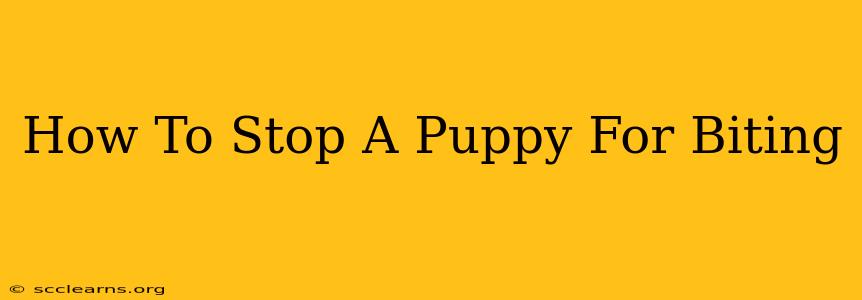Bringing a new puppy home is an exciting time, filled with playful cuddles and endless puppy kisses. However, puppy biting is a common problem that frustrates many new pet owners. Understanding why puppies bite and implementing effective strategies is crucial for raising a well-behaved and happy dog. This comprehensive guide will equip you with the knowledge and techniques to curb your puppy's biting habit.
Understanding Puppy Biting: Why Does My Puppy Bite?
Before we dive into solutions, it's important to understand why puppies bite. It's rarely out of aggression; instead, it stems from several reasons:
- Teething: Like human babies, puppies experience teething pain, and biting provides relief.
- Exploration: Puppies explore the world through their mouths. Biting is a natural way for them to investigate textures and objects.
- Play: Puppies often bite during play, misinterpreting the intensity of their actions.
- Excitement: Over-excited puppies may bite out of sheer enthusiasm and uncontrolled energy.
- Fear or Anxiety: In some cases, biting can be a sign of fear or anxiety, especially if accompanied by other signs of stress.
Effective Strategies to Stop Puppy Biting
Now that we understand the underlying causes, let's explore practical and effective methods to stop your puppy from biting:
1. Positive Reinforcement Training: Rewarding Good Behavior
This is the cornerstone of successful puppy training. Instead of focusing solely on punishing biting, reward your puppy for not biting. When your puppy is calm and behaving well, offer praise, treats, or a favorite toy. This positive reinforcement strengthens the desired behavior.
2. Teach Bite Inhibition: The "Ouch!" Method
Puppies need to learn bite inhibition – the understanding that biting humans hurts. When your puppy bites too hard, immediately yelp loudly, like a puppy would. This mimics the reaction of another puppy, signaling that the bite was too forceful. Then, completely ignore your puppy for a short time (30 seconds to a minute). This teaches them that biting leads to the loss of attention and play.
3. Supervise Interactions: Preventing Opportunities for Biting
Constant supervision is essential, especially during playtime. If you see your puppy getting overly excited or starting to nip, immediately redirect their attention to a chew toy or a different activity.
4. Provide Plenty of Chew Toys: Satisfying Natural Instincts
Puppies need to chew. Provide a variety of safe and appealing chew toys to satisfy their natural chewing instincts. This reduces their urge to bite on your hands, feet, or furniture.
5. Manage Your Puppy's Energy Levels: Preventing Over-Excitement
A tired puppy is a less likely biter. Ensure your puppy gets enough exercise and mental stimulation throughout the day. Regular walks, playtime, and interactive games help burn off excess energy and prevent over-excitement.
6. Consistency is Key: Patience and Persistence are Crucial
Remember, consistency is crucial in puppy training. Everyone in the household needs to follow the same training techniques to avoid sending mixed signals to your puppy. Be patient, persistent, and celebrate small victories along the way.
When to Seek Professional Help
If your puppy's biting persists despite your best efforts, or if the biting is aggressive or excessive, it's essential to seek professional help from a veterinarian or a certified professional dog trainer. They can assess the situation, identify the underlying causes, and provide tailored guidance.
Conclusion: A Well-Behaved Puppy is a Happy Puppy
Stopping puppy biting requires patience, understanding, and consistent effort. By implementing the strategies outlined above, you can effectively curb your puppy's biting behavior and build a strong, loving bond based on mutual respect and understanding. Remember, a well-behaved puppy is a happy puppy, and a happy puppy brings joy to the entire family.

